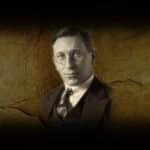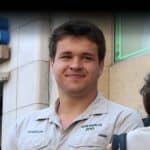Frederick Banting, born on November 14, 1891, is a Canadian medical scientist, physician, and co-discoverer of insulin! Following his graduation, he served in the military from 1916 until 1918 before continuing his educational journey in the medical field. His interest in diabetes came about in 1920. Researching the disease and how the pancreas plays a role in its cause was the start of something great. In 1923, he and his co-discoverers won the Nobel Prize in Medicine. Let’s learn more about his research, career, and other interests here as we celebrate his birthday!
Fast Facts
Full Name:
Frederick Banting
Nickname:
Fred
Birth date:
November 14, 1891
Death date:
February 21, 1941
Age:
49 years, 3 months
Zodiac Sign:
Scorpio
Height:
5' 7"
Net Worth:
$700000
Background
Sir Frederick Banting is one of the best-known Canadian medical scientists, physicians, painters, and the co-discoverer of insulin. Banting was born on November 14, 1891, in Ontario. He attended a public high school in Alliston and furthered his education at Victoria College in 1910. He started his college educational journey with a general arts program that he unfortunately failed. Undeterred, he joined the medical program in 1912. In 1915, Banting joined the military. After graduating from the medical program in 1916, he immediately commenced his military duties. The following year, he was awarded the ‘Military Cross’ for his heroic acts.In 1918, he was awarded the license to practice medicine, surgery, and midwifery by the Royal College of Physicians of London. Post-war, he traveled to Toronto to start his surgical training and studied orthopedic medicine. Between 1919 and 1920, he worked as a resident surgeon at the Hospital for Sick Children. He also worked as a part-time lecturer at the University of Western Ontario for orthopedics and anthropology. He received his Doctorate of Medicine degree in 1922. He got together with physiology professor John Macleod, medical scientist Charles Best, and biochemist James Collip to discuss how to approach and isolate insulin. The first injection of insulin was in early 1922 into a 14-year-old patient. Later that year, Banting established a private practice to treat diabetic patients. Together with Macleod, they were awarded the Nobel Prize in Physiology or Medicine in 1923. The duo split the prize money with their insulin co-discoverers Best and Collip. In the late 1930s, he furthered his research into the physiological problems experienced by pilots flying high-altitude combat aircraft. During World War II, he invented the G-suit to prevent blackouts experienced by pilots subject to high levels of acceleration force.The genius medical scientist also had an artistic side and loved painting too. He is also known as “one of Canada’s most accomplished amateur painters.” Banting was married twice. His first marriage was to Marion Robertson in 1924 with whom he had a son, William. They divorced in 1932. He married Henrietta Ball, a physician, and director of Women’s College Hospital’s Cancer Detection Clinic, in 1937. Banting, unfortunately, succumbed to his injuries sustained from an airplane crash in 1941 at the young age of 49.
Career timeline
Banting joins the military after college.
He works as a resident surgeon at the Hospital for Sick Children.
He obtains his Doctorate of Medicine Degree.
He discovers a way to isolate insulin and begins the procedure of extracting insulin from animals.
Banting starts up a private medical practice and treats patients with diabetes.
He is awarded the Nobel Prize in Physiology or Medicine for his discovery.
Frederick Banting FAQs
How much did Frederick Banting sell insulin for?
Banting wanted everyone who needed insulin to be able to afford it and for this reason, he sold insulin for only $1.
How was diabetes treated before insulin?
Before insulin injections were discovered, people with diabetes didn’t live long as doctors couldn’t do much except put the patients on strict diets.
Did Frederick Banting travel or pursue other interests?
Yes. As a keen painter, Banting once took part in a painting expedition above the Arctic Circle, sponsored by the government.
5 Surprising Facts
-
The Medical Hall of Fame
Banting was inducted into the Canadian Medical Hall of Fame due to his discovery and contribution toward the medical industry.
-
Top 10 greatest Canadians
Banting is listed as number four of the top 10 greatest Canadians of all time as announced by the Canadian Broadcasting Corporation.
-
The Banting House
His former home in London was declared a National Historic Site of Canada and called the Banting House, and is also known as “The Birthplace of Insulin.”
-
All hail Knight Banting
Banting was knighted after World War I by King George V, Knight commander and Order of the British Empire, and was the first and last Canadian to become a knight.
-
The Nobel prize
Banting was the youngest doctor and the first Canadian ever to receive the Nobel Prize in Medicine.
Why We Love Frederick Banting
-
His name lives on
Plenty of medical awards and institutions have been named after Banting. Some are the Banting Research Foundation, Banting and Best Institute, the annual Banting Lectures given by diabetes experts, Banting Memorial High School in Alliston, the ‘Major Sir Frederick Banting Award for Military Health Research,’ and lots more!
-
He’s an inspiration
Banting has contributed to numerous medical research besides insulin isolation. Many students in the medical field are inspired by his work and studies.
-
His curiosity has saved millions of lives
Although insulin injections are not the cure for diabetes, it helps prolong the lives of those with the disease. In this case, curiosity did not kill anybody!
Frederick Banting’s birthday dates
| Year | Date | Day |
|---|---|---|
| 2022 | November 14 | Monday |
| 2023 | November 14 | Tuesday |
| 2024 | November 14 | Thursday |
| 2025 | November 14 | Friday |
| 2026 | November 14 | Saturday |
































